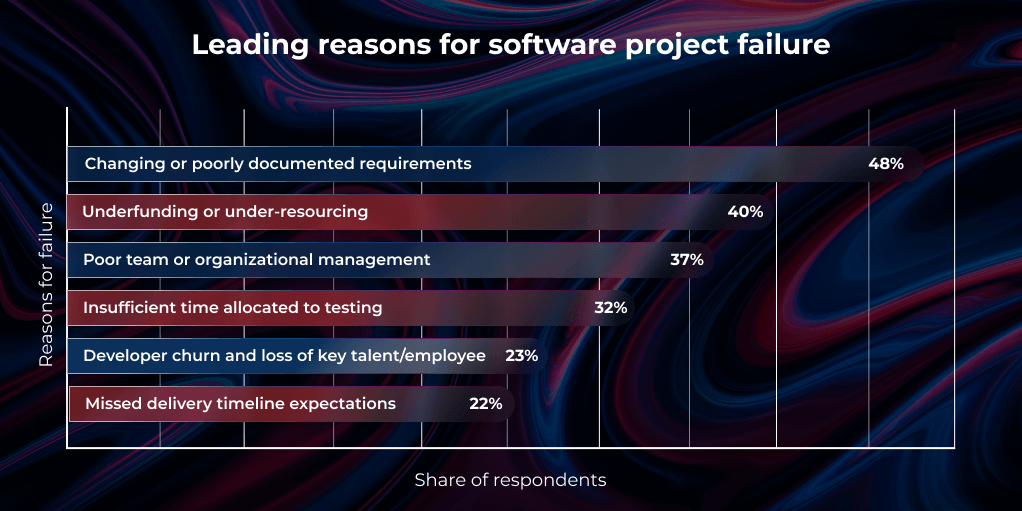When a project succeeds, there are many people eager to take credit. But who is responsible when the same project fails? What causes a project to fail? A primary reason could be an incorrect or incomplete set of requirements. Studies indicate that unsatisfactory requirement gathering contributes to 48% of project failures. When a project fails, what is the most common assumption made? Usually, it’s assumed that the project manager failed or that it was due to the incompetence of the IT department.
IT and business have always existed as two separate domains in an organization. Technology departments are oriented and focused towards new technologies, their functioning and deployment. On the other hand, business units are aligned towards customer requirements and are concerned more about ROI, driving revenue and the overall profit and loss. IT and business rarely have a direct communication.
As shown in the image above, there are several leading reasons why software projects fail, according to survey.
- Changing or poorly documented requirements is the leading cause of software project failure, affecting 48% of projects. Having a dedicated Business Analyst (BA) can help in such situations by ensuring that requirements are clearly defined, documented, and communicated to all stakeholders.
- Underfunding and under-resourcing contribute significantly to project failure, impacting 40% of projects.
- Poor team or organizational management is a critical factor, affecting 37% of projects.
- Insufficient testing time impacts 32% of projects, highlighting the importance of thorough testing.
- Developer churn and loss of key talent affect 23% of projects.
- Missed delivery timelines impact 22% of projects.
What is the link that connects IT and business?
Business Analyst is one person, who is the bridge between these two entities. A business analyst can also be called a liaison that understands the business requirements, and translates the same to the organization’s IT group as a project definition towards building a successful solution. Alternatively, he is also the communication channel to convey the potential of the technical team to the business unit.
A business analyst works towards both the business needs of an organization and its IT infrastructure. His objective is the alignment of the systems and software, for the company’s competing benefits.
How does a Business Analyst serve as the cornerstone of Project Success?
Let us here understand how a business analyst contributes to a project’s success.
-
Requirement Gathering: Fundamentally the role of a business analyst is gathering and documenting the user requirements. A business analyst is one person, who understands both technology and business domain. According to the Business Analyst Team at Intelegain, a BA is the 49% product owner and a single point contact between the business and development team.
-
Creating the BRD: A BRD or business requirement document is a detailed study of functional and non-functional user requirements. A BRD provides an insight (both existing and future) of the business. It is the business analysts’ responsibility to create the BRD and the FRS/ SRS (Functional Requirement Specification, or Software Requirement Specification).
-
Scheduling: Another role of a business analyst is getting the sign-off for the SRS, creating the design (wireframes) and milestone preparation. Wireframes are the templates created by a business analyst, to showcase the overall user-experience.
-
WBS – Work Breakdown Structure: A WBS is decomposition of a project into smaller components, based on deliverables or timelines. Business Analyst creates this significant tool for project management, and helps make the planning process more manageable.
-
Functional Testing: A Business Analyst is also responsible for performing the Functional Testing with the QA (quality assurance) and design team. This involves identifying if the software functions as per the customer’s expectations.
-
BAs Ensure Quality and Compliance: In regulated industries, quality and compliance are crucial to the success of IT projects. Business analysts play a key role in ensuring the final product adheres to the required quality standards and complies with all relevant regulations and policies. They collaborate closely with quality assurance (QA) teams to create test cases and ensure that solutions are thoroughly tested against business requirements.
-
BAs Enable Communication and Collaboration: Effective communication and collaboration are essential for the success of an IT project. Business analysts act as facilitators, ensuring that stakeholders, project managers, developers, and other team members are aligned. They organize and lead meetings, workshops, and discussions to clearly communicate requirements, progress, and issues.
What are challenges faced by a business analyst?
After learning about the roles and responsibilities of a business analyst, let us understand about the various challenges for a BA.
-
Resource Dearth and Sharing: Shortage of competent resources (both at fresher an intermediate level) is truly a challenge for business analysts. In a situation of inadequacy, resource sharing may follow. Resource sharing may lead to missing of the time constraints at the time of project delivery.
-
Underestimated Timelines: This happens when there is absence of buffer time or elapse time, and in scenarios of stringent timelines.
-
Client Communication: Any kind of hitches in the client communication may thereby lead to documentation flaws. Therefore, it is significant that the interaction with client is timely, quality oriented and accompanied with a good understanding of the business. This is an illustration of a business analyst’s interpersonal skills.
Let us summarize the role of a Business Analyst in a nutshell, with the thoughtful words of an Intelegain BA. She says, “A business analyst is a fulcrum, with an understanding of the complexities involved in a business process as well as the ability to measure IT contribution to their organization’s business profits”.
Enhancing the proficiency of a business analyst can lead to the strengthening of the business on the whole. And, we at Intelegain Technologies have been very meticulously doing it. BAs at Intelegain can add value to your business requirement and enable you drive the first step in getting your idea off the ground. Reach out to us at contactus@intelegain.com.











